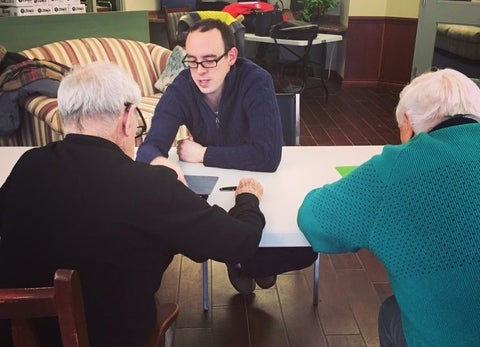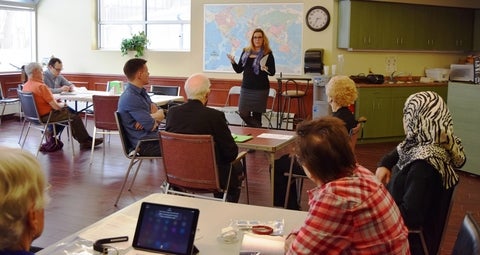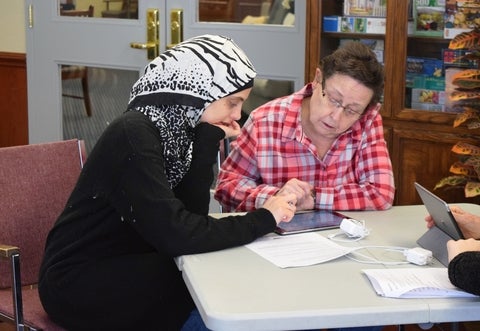Approximately 88% of Canadian older adults struggle to comprehend medical information. Low health literacy is linked to poor health outcomes, a fact that is especially worrying given that elderly patients tend to suffer from chronic health conditions, like diabetes or high blood pressure.
By providing tools to improve health literacy, pharmacists can help patients better manage conditions and interpret vital information.
Assistant Professor Kelly Grindrod and PhD candidate Kate Mercer are partnering with local organizations to do just that: they built eHealth Literacy Workshops to match students with KW seniors in four weekly educational sessions. Students worked one-on-one with seniors to teach a variety of health strategies.

Pharmacy student Jonathan Boersema volunteering with seniors at Waterloo Heights Retirement Community.
Teaching eHealth literacy strategies
In the Workshops, which ran through 2015 and 2016, seniors learned how to identify appropriate websites for health information and even tested out a variety of devices like iPads and wearable fitness trackers. Grindrod and Mercer have shown that Fitbits and other wearable tracking devices are helpful tools for seniors as they promote awareness about physical activity. Thus, educating on those devices was an important part of the curriculum.
There is a misconception that the elderly population has difficulties adapting to newer technologies,” said one student volunteer. “That was not the case. The participants were all ready and eager to learn and came to us with many questions.
To cover as broad an audience as possible, the eHealth workshops took place in various settings - local retirement communities, libraries, and at the School of Pharmacy. The ultimate goal was to present a health literacy curriculum, developed by Mercer and other health literacy experts, and to provide seniors with the tools to take ownership of their own health. Building self-efficacy was key to ensuring that the skills learned would carry forward in the seniors’ lives.

PhD Candidate Kate Mercer explaining wearable fitness devices to a group of volunteers and seniors.
“Our residents not only felt better equipped to look up health information online but more comfortable with technology in general,” said Maia Hillen, Program Director at Waterloo Heights Retirement Community. “The one-on-one tutoring was the key. It let our residents move at their own pace and feel comfortable asking questions.”
Workshops a win-win for all involved
The older adults weren’t the only ones to benefit. The Kitchener Waterloo Community Foundation, one of the program sponsors, has identified that students as a population often feel a weak sense of belonging to their community. Through the Workshops, School of Pharmacy students were able to overcome this by connecting with members of their community and sharing their knowledge with a group in need of it.

Mastering the iPad was one of several digital literacy techniques the older adults learned.
"It meant a lot to me, how enthusiastic the students were about working with us.” One senior said.
Another added:
Working with the students was lovely. They were so patient, and great at teaching us anything we asked about. I thought I wasn’t able to use an iPad until my student walked me through it a few times - now I want to get one to Skype with my kids
By motivating positive changes in the senior’s lives, the student volunteers gained that sense of involvement and community immersion.
Because of the seniors’ enthusiasm and interest, I really felt that I was making a difference," one student said. "Educating people on how to get the best out of the electronic resources they had available to them was so rewarding.